Parking Lot Maintenance: Choosing the Best, Easy Way to Maintain Solution
When it comes to choosing what kind of parking lot you want for your business, one of the biggest things you have to consider is how much maintenance you’re willing to do. Certain materials require more maintenance than others, and depending on how much traffic you get, what the weather is like, and a variety of other factors, you may end up having to perform regular, costly maintenance on your parking lot.
For some, it’s worth it to be able to have a professional-looking parking lot for their business. For others, however, parking lot alternatives are becoming more and more attractive, especially as parking lot materials and products continue to improve and evolve.
Let’s break down how much maintenance you’ll actually need to perform and what alternatives are available:
Asphalt Lot Maintenance
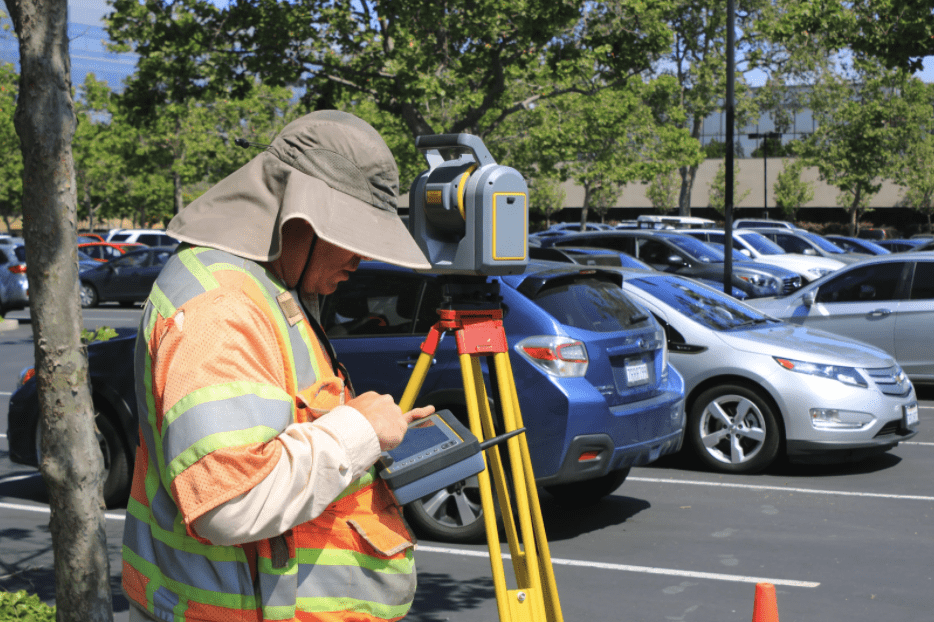
Asphalt is the single most common material used for building parking lots around the world. Up until now, it has been one of the cheapest and most durable materials for use in parking lots, with over 90% of the world’s parking lots built with asphalt.
Asphalt is not a perfect material, however, and needs a lot of long-term maintenance. Sweeping and cleaning are the most basic of asphalt’s maintenance requirements. Indeed, almost every type of parking lot will require a brief sweeping and hose down every now and then.
Resealing of the top protective layer on an asphalt parking lot is also necessary frequently, especially in snowy areas where snow removal strips this protective layer away. It costs about 20 cents per square foot to reseal an asphalt parking lot and if not performed at least every 2 years, the lot will quickly begin to deteriorate, leading to the need for much more expensive repairs.
Cracks that develop in asphalt parking lots also need to be filled in as soon as they are discovered, or else they will widen and allow more water and debris to penetrate deeper into the lot, worsening the problem.
To make an asphalt lot look brand new, you need to strip off the whole top layer and add a new one. This is more expensive than sealing a lot, but not as expensive as repaving an entire asphalt lot from top to bottom, as is typically required once every few decades or so. There is also the frequent repainting of lot lines which is required to keep them visible.
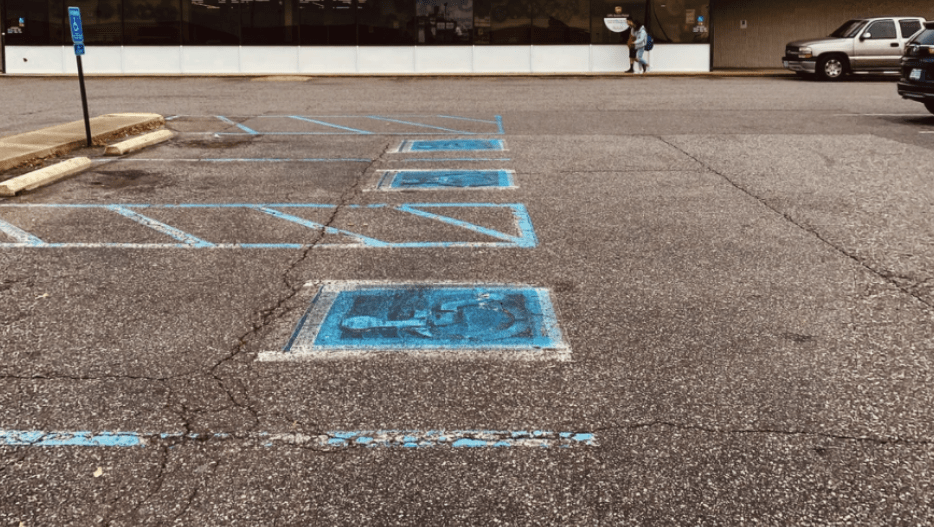
Concrete Lot Maintenance
Parking lot maintenance for concrete is very similar to that of asphalt. Concrete lots need to be sealed to prevent weathering damage, and they require filling in of cracks as well. Repainting lot lines and full-on resurfacing are also required within the lifetime of a concrete lot. Water can wreak havoc on a concrete lot causing upheaval and cracking. The same goes for tree roots which overpower the concrete over time.
Low-Maintenance Parking Lots
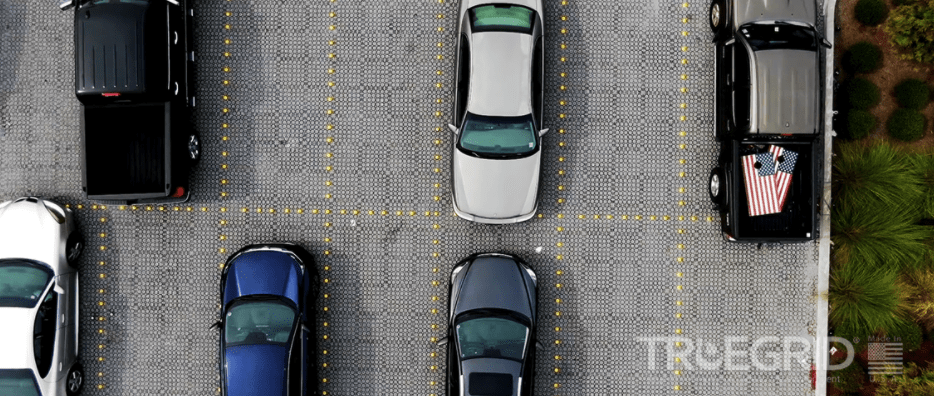
The only option for owning and operating a fully functional, professional parking lot that can perform its duties in residential, commercial, or industrial settings is to use permeable pavers. Permeable pavers like the ones produced by TRUEGRID are able to use multiple types of aggregate locked beneath and in the cells durable plastic pavers.
They are incredibly simple to install and stay locked into place throughout their 60 plus year lifetime. Because they are permeable, no drainage or washing is required, and liquids drain directly through them into the soil beneath. They hold the gravel fill in place so there is virtually no maintenance needed.
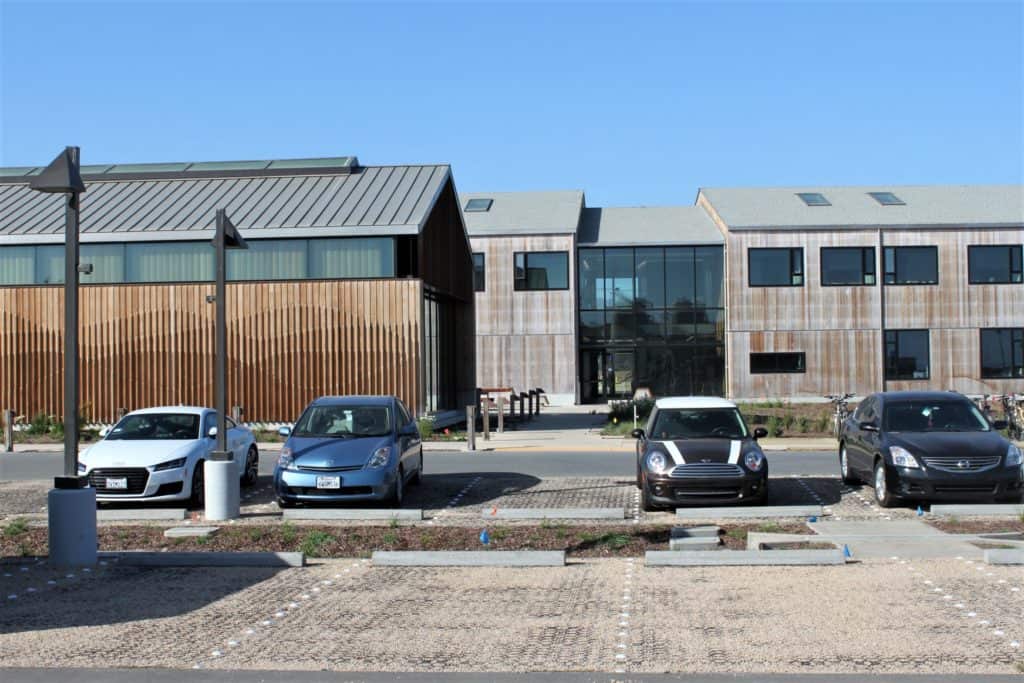
Permeable paver lots require almost no maintenance at all once they are installed, because the 100% recycled plastic pavers are nearly immune to all types of wear and tear, weathering, and degradation.
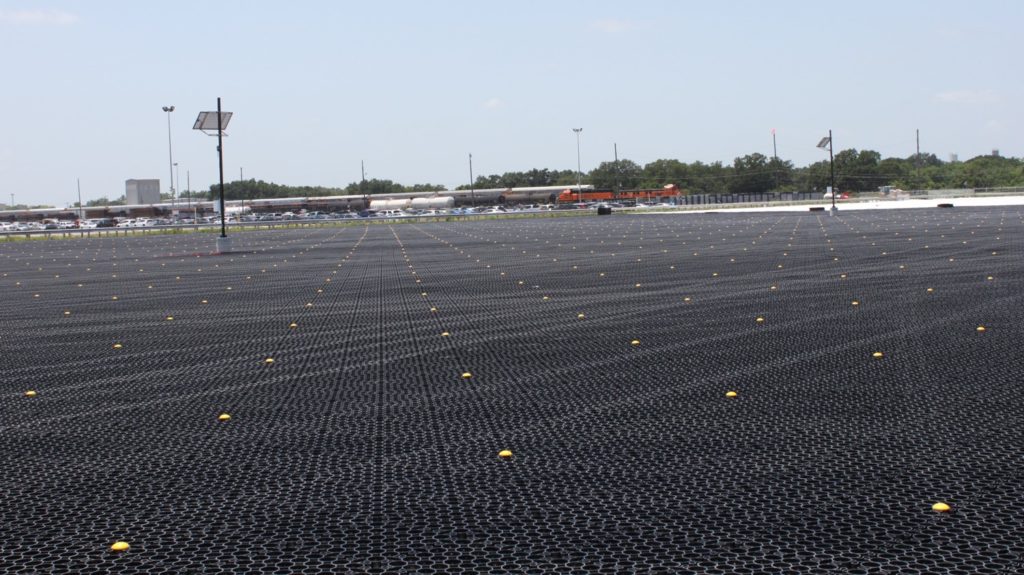
Far more durable than either asphalt or concrete, TRUEGRID’s permeable pavers are also much more eco-friendly, have more creative style options, and are cheaper to install and maintain.
Moreover, they can even be used in tandem with smaller amounts of concrete or asphalt to provide you the benefits of these impermeable materials while lessening the overall maintenance bill and improving the durability of your parking lot.
Lot Maintenance Fees Can Add up Quickly
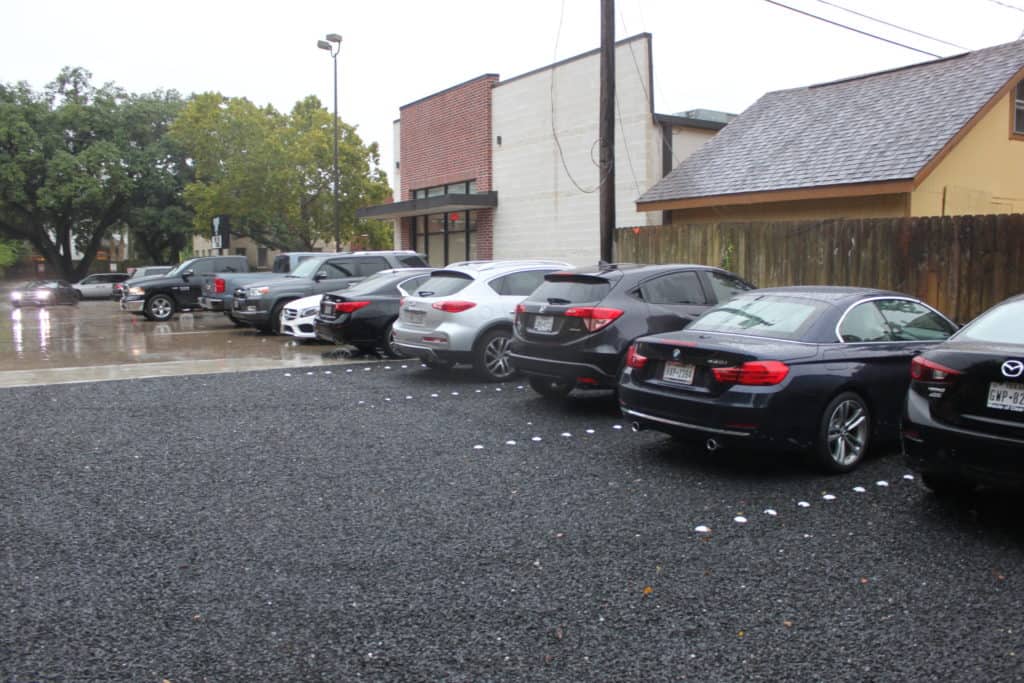
Asphalt has long been the standard when it comes to parking lots, but the advent of permeable pavers and other products offered by TRUEGRID has greatly reduced the need for the parking lot maintenance.
By implementing a parking lot built with permeable pavers, you can enjoy the benefits of a parking lot that functions as well, if not better than asphalt or concrete. The biggest downside to owning an asphalt or concrete lot is the expense of keeping it maintained throughout the years, often totaling upwards of $100,000.
If you want to eliminate costly parking lot maintenance expenses while still having a beautiful, durable parking lot, TRUEGRID’s permeable pavers are the best place for you to start.
There are many reasons why you might want to install a gravel parking lot for your business. It might be a temporary fix, a way to cut costs, or a precursor to a paved asphalt or concrete parking lot, but there are a few things you need to consider before you install a gravel parking lot.
In order to help you through the process as smoothly as possible, here are some things you need to take into consideration before laying a gravel parking lot.
Is It Temporary or Permanent?
First, you must decide whether your gravel parking lot is going to be temporary or permanent. A temporary gravel parking lot requires much less preparation and planning, typically being laid within a quickly excavated, shallow subgrade.
Temporary gravel-only parking lots are gravel sites not held in place by any type of pavers, and as such tend the gravel tends to rut and scatter quite easily. They can work as a temporary solution,but will be a constant headache due to mud, ruts and dust. This may not be appropriate for your business.
Permanent gravel parking lots can be vastly improved with just a little more preparation. If your goal is to stabilize the gravel, eliminate dust and mud, and all maintenance a plastic grid paver can be thrown down on top of compacted gravel and filled with gravel to create an inexpensive temporary or permanent gravel solution. Most cities code gravel-only as impervious just like asphalt or concrete and require offsetting drainage and detention. With a permeable plastic grid system, you have choices. You can simply stabilize the gravel to stop the headaches. Or you can add a detention base under the grid surface to meet stormwater detention codes. The lot can be used for 60 years or 6 months. The plastic grid can be picked up and reused if the need for the temporary lot is done or the site is being repurposed.

In short, not only do permeable plastic grid pavers work great for a temporary parking lot, they are perfect for creating long-lasting, durable gravel parking lots that outperform even other materials like asphalt and concrete.
How to Build the Perfect Gravel Parking Lot
For gravel parking lot construction that can perform just as well as other common types of parking lots, you’ll want to find a high-quality paver company such as TRUEGRID. The pavers for gravel parking lots that TRUEGRID makes are of the highest quality and extremely durable. The patented system is designed specifically for commercial and industrial applications.
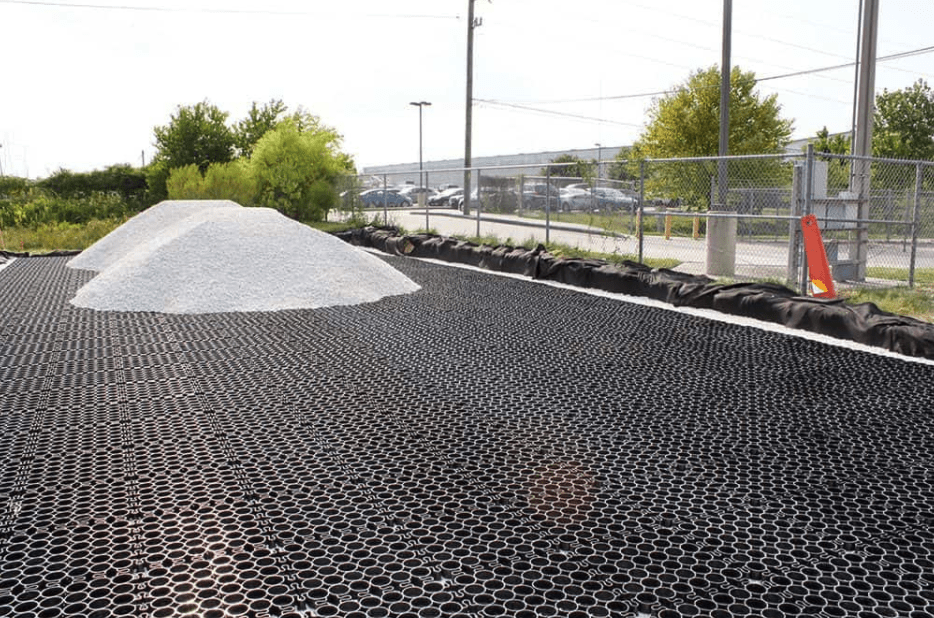
They are 100% permeable, meaning they provide built-in stormwater detention capacity and drainage directly into the soil below. Because these permeable pavers have a top layer of interlocking grids, the gravel cannot migrate elsewhere and the gravel on top is locked firmly into the pavers. This creates a solid, firm surface to drive and park on.
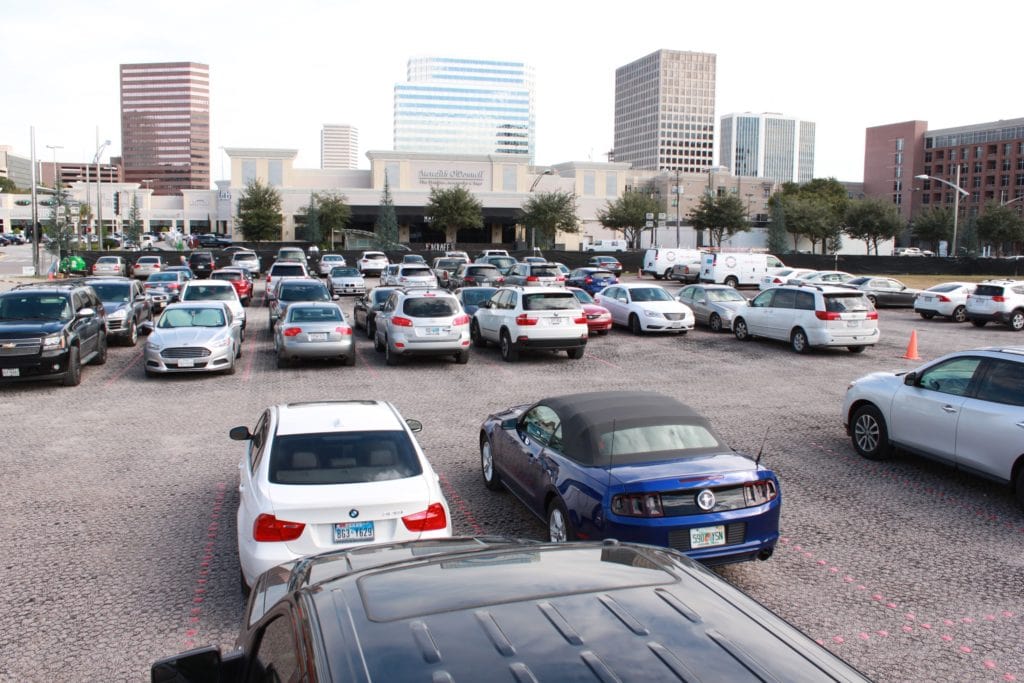
TRUEGRID has many different products available for creating the best gravel parking lot. Items such as the SuperSpot and SnowSpots act like permanent lot lines (but are easy to change) and come in a variety of colors. Reflectors, word plates for labeling parking spaces, and gravel-free, ADA compliant DECK grids are also available to add to your permeable paver parking lot.

Why Use a Gravel Parking Lot?
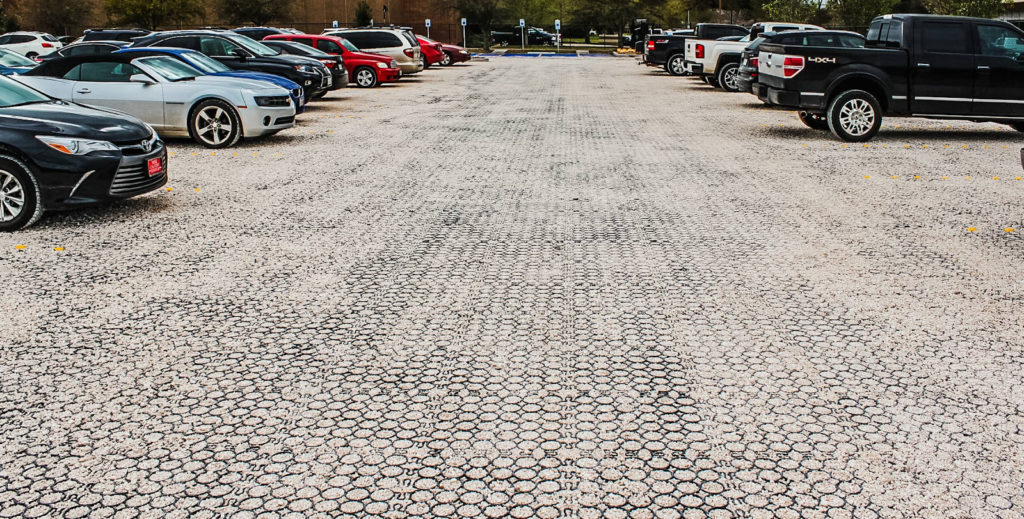
There are many reasons why you might want to use gravel parking lot construction instead of concrete or asphalt. First, gravel parking lots held in place with TRUEGRID pavers are for more inexpensive to install than concrete.
The installation time is much quicker as well, and TRUEGRID permeable paver parking lots are more durable than concrete and asphalt parking lots. They offer fewer maintenance headaches than gravel-only, asphalt, or concrete. They offer 100% land use by being pervious and eliminating the need for separate detention ponds or underground water storage.
There are also more style options, room for creativity with multiple types of gravel for use, as well as different types of lot lines. TRUEGRID is a leader in the field when it comes to eco-friendliness, and all of TRUEGRID’s grid products are made from 100% post-consumer recycled plastic.
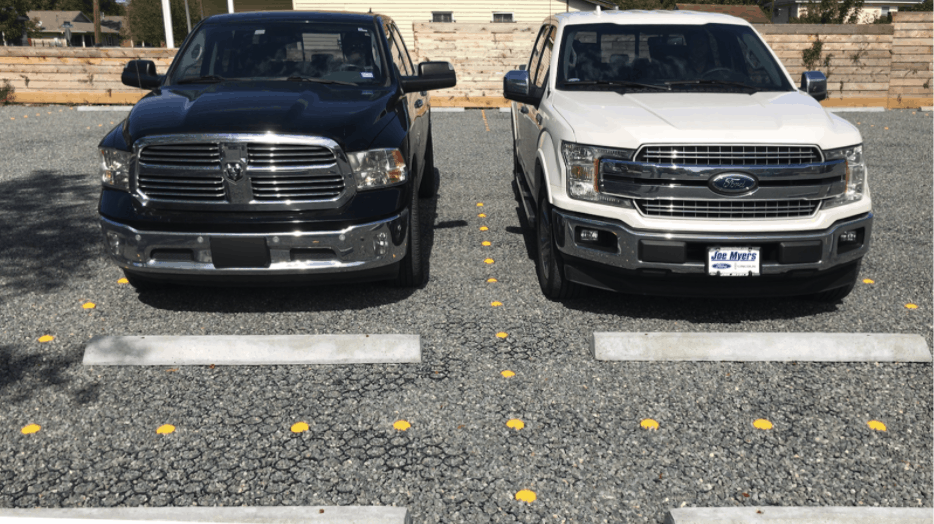
The production, transportation, and installation is designed to be as energy-efficient and eco-friendly as possible, making TRUEGRID one of the premier companies in the permeable paving industry.
The Downsides of Temporary Gravel Lots
Although they can act as a quick fix, it’s easier to invest the time and effort into installing gravel-filled grid lot that can be either a temporary or permanent lot, rather than setting yourself up to deal with the myriad of problems that gravel-only lots can present.
Challenges such as potholes, wash-outs, dust clouds leading to scatter, and traffic-related gravel migration will all eventually happen if you install a gravel-only parking lot without pavers.
You might even need to worry about a drainage system as well, depending on what type of soil your gravel parking lot has directly beneath it in the subgrade. Gravel lots become compacted over time and are essentially impervious and are coded as such. Less permeable soil types like clay may require additional means to drain your parking lot when it rains., so that you don’t have to deal with large-scale flooding in your lot as well.
The Right Type of Gravel Lot Can Work for Your Business
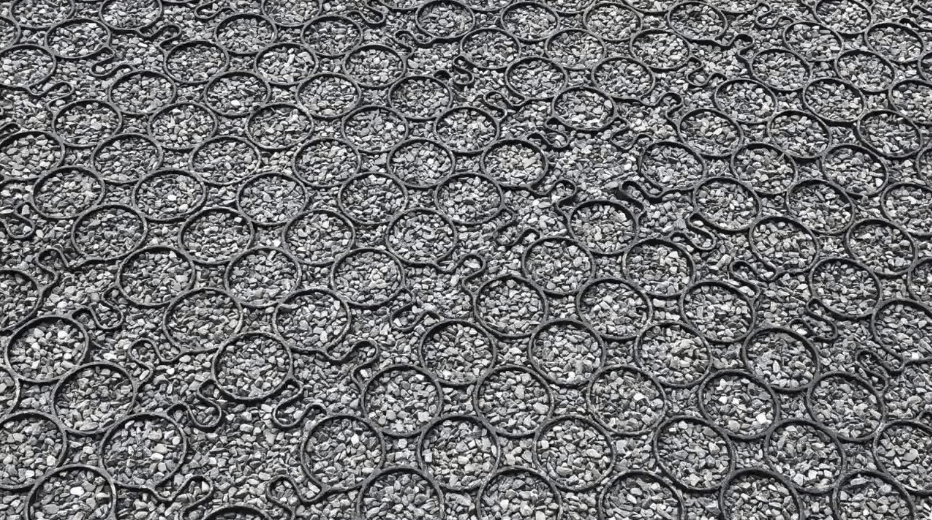
Most people consider gravel parking lot construction to be low-rent, but what many are now understanding is that they can be extremely attractive depending on the gravel fill used for the grid system. The natural aesthetic combined with the drainage and permeability benefits not to mention cost advantage really makes this the best solution for most sites. Permeable pavers from TRUEGRID are the highest-performing for heavy traffic and heavy load gravel parking lot construction.
Not only do they outperform asphalt and concrete in terms of durability, stylistic variance, cost-effectiveness, ease-of-installation, and eco-friendliness, they can easily be pulled up and replaced with another type of material should you choose. This makes them the perfect product to experiment with for installing your first gravel parking lot. Those that have tested the system now use it as SOP for new lot construction. Let the experts at TRUEGRID assist with your gravel parking lot construction.
Once you make the decision to hire a commercial paving contractor to pave your parking lot and/or other areas around your business, choosing the right company for the job can make a world of difference. There are a variety of things you might place a high priority on, and only certain companies may deliver on certain qualities.
How to Find a Commercial Paving Contractor
We’ve put together a list of 7 helpful tips you can use to help you find the paving contractor best suited for you and your business.
1. Look for a Local Team
The locality of your paving contractor can have a huge impact on the price and quality of the job. Local companies might have more of an incentive to perform better knowing that the evidence of their quality of work will be permanently located nearby. The transportation costs of materials like asphalt, concrete, and heavy equipment can also add up quickly, giving you yet another reason to go local if possible.
2. Ease of Installation is Key
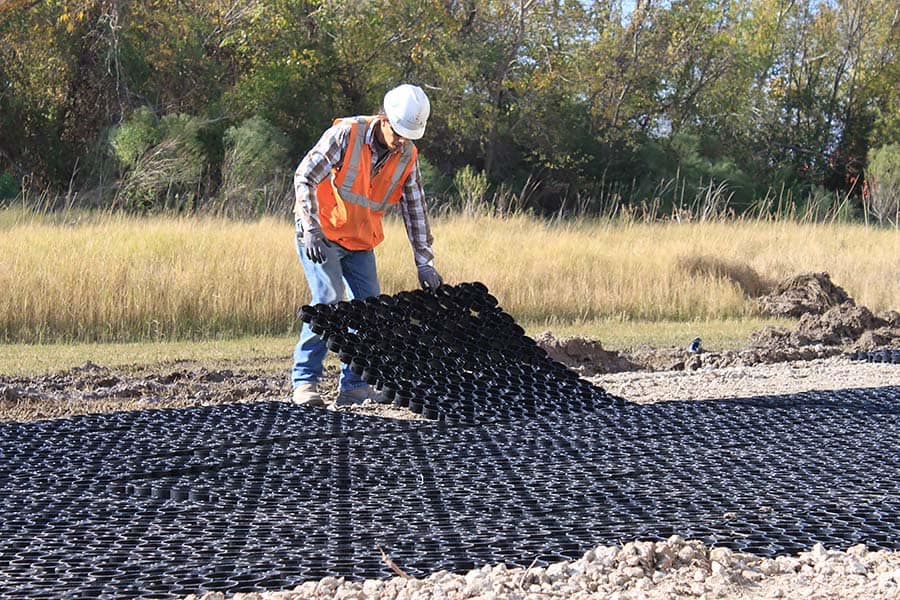
This is another quality you should look for when choosing a paving contractor for your commercial business. The easier it is to install your pavement, the lower the overall cost will be and the quicker you can get back to normal business.

Some materials like concrete and asphalt have rather long completion times due to the need for the materials to dry and set, while other paving materials like permeable pavement can be easily completed in as little as one day.
3. Have Low Maintenance Requirements
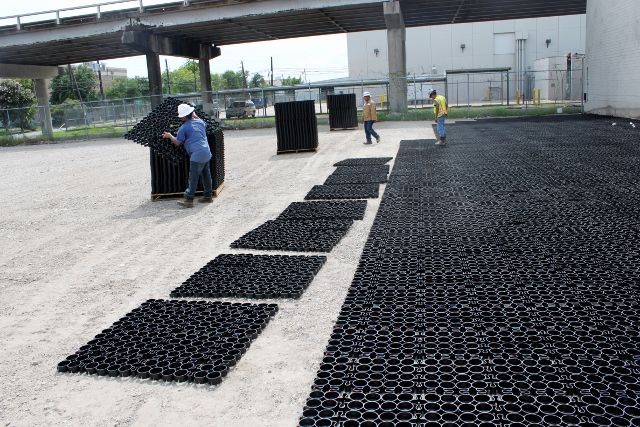
The amount of maintenance that your pavement will require should play into your decision as well. Common commercial pavement materials like asphalt and concrete will degrade over time and will require re-paving as well as re-painting of your lot lines.
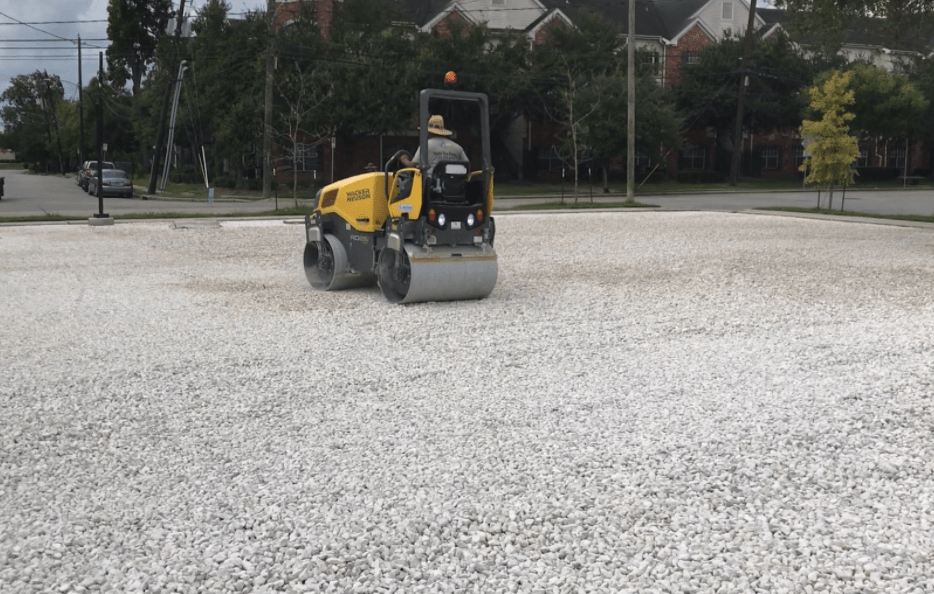
This will mean recurring instances of maintenance that will cost you time and money, and should factor into your overall assessment of price. Gravel filled-plastic grid permeable pavement, designed specifically for heavy load and heavy traffic commercial applications, is much more of a set-it-and-forget-it type of installation, requiring very little in the way of maintenance, even over long periods of time.
4. Aim for Permeability
You have two choices when it comes to commercial pavement, pervious and impervious materials. Impervious pavement will require special drainage systems to prevent flooding during heavy rain events. In many cases, commercial pavement contractors using permeable pavement will give your pavement the ability to drain any and all liquids directly through the pavement itself, acting as a built-in drainage system without the added cost.
You can also combine permeable and impermeable materials together if you want the best of both worlds. For example, gravel-filled permeable grid pavers can be sued primarily in parking spots and drive lanes can be impervious hardscape.
5. Select Eco-Friendly Materials
One often-overlooked element of commercial paving is the environmental-friendliness of the material and methods used to install it. Both concrete and asphalt have significantly more negative impacts on the ecosystem than the 100% recycled plastic used in permeable pavers. The production, transportation, and installation of permeable pavement are also designed to be as eco-friendly as possible (depending on which company you go through). Permeable grid pavers act as natural filters to remove pollutants through infiltration and bioremediation into the soils, mimicking nature’s hydrology.
6. Require Cost-Effectiveness
The cost is obviously going to play a huge role in determining which commercial paving contractors you favor. While concrete and asphalt contractors tend to range on the pricey side of things, permeable pavement contractors for plastic grid systems are almost always one of the most affordable options you can find. Besides the installation cost benefits over concrete, this approach provides land savings compared to asphalt or concrete by offering 100% land utilization without added drainage or detention system expense.
As an added bonus, long term maintenance expenses are dramatically lower.
7. Stylistic Versatility

The stylistic variance available to you when choosing amongst commercial paving contractors should also play into your ultimate decision. While asphalt is known to be incredibly limited in terms of stylistic options, it can work if you only want black pavement with white or yellow lot lines.
Concrete is similar, offering not much else besides white and yellow striping. The most options you’ll find when it comes to commercial paving contractors are likely to be found in the available packages offered by your local permeable paving company. Permeable grid pavement can be laid with a variety of different-colored fill aggregates and lot line markers.
This gives you the options to install pavement featuring a variety of different shades and colors, and will allow you to customize your commercial pavement much more than you would be able to with traditional concrete or asphalt.
Weigh All Your Options Before Choosing a Commercial Pavement Contractor
Before you install your commercial parking lot or other type of pavement, remember that you have more available to you than just concrete or asphalt. Permeable pavement comes with a variety of unique benefits that you might find desirable, and it also happens to be more cost-effective and durable than either concrete or asphalt.
If you prioritize eco-friendliness, ease-of-installation, low maintenance requirements, and long-term performance, you might just want to consider linking up with a local permeable pavement contractor instead of an asphalt or concrete one.
Contact TRUEGRID for help locating the perfect contractor for your permeable pavement project.
Parking lots are similar in that they all share a common characteristic, they are used to park vehicles. They also need to be able to effectively perform for an extended period of time.
Vehicles come in all shapes and sizes, however, like giant 18-wheelers and transportation trucks. Due to the sheer size and weight of these types of vehicles, their parking lots also need to be adapted to handle the extra weight.
Parking lots are subject to a number of environmental and man-made factors that need to be taken into consideration before construction, and truck stop parking lots are no different. The materials required to support these massive trucks can’t be anything less than the best if you want your parking lot to last. A truck stop parking lot built with average or low-quality materials will degrade much faster than a regular supermarket parking lot, for instance.
In case you’re looking to build a truck stop parking lot, let’s go over everything you need to know so you can create the highest-performing parking lot possible and minimize any unnecessary maintenance costs as well.
How to Plan a Truck Stop Parking Lot
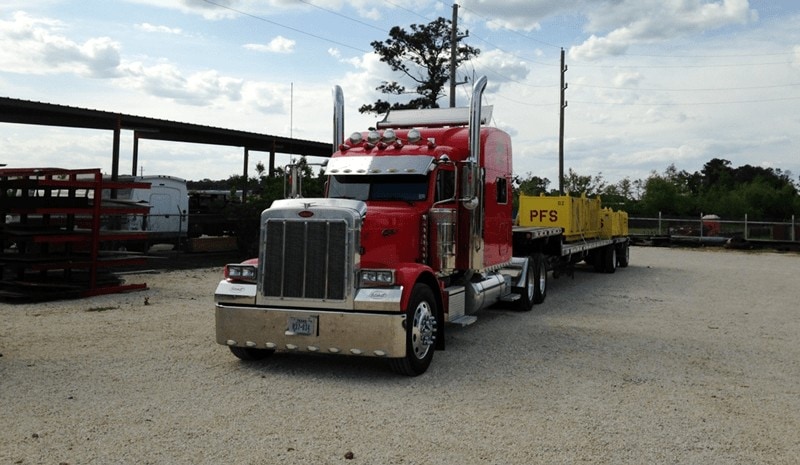
The first thing any good truck stop parking lot design needs is a careful consideration of the forces and stresses that will be placed on it throughout its lifetime. We’re talking about factors such as multi-ton vehicles driving and parking on the lot for extended periods of time, temperature fluctuations, drainage concerns, and landscape fixtures as well.
The material you build a truck stop with can have an impact on the overall cost of the project as well. Concrete and asphalt, for example, are impervious materials. This means you’ll need some kind of drainage system, sump pumps, and possibly a detention pond to deal with all the stormwater.
There are also other factors that can have a big impact on the long-term health of your truck stop parking lot if it’s made out of asphalt or concrete. Asphalt gets hot, sticky, and soft in the summer heat. Heavy trucks can easily tear up asphalt in hot climates. Concrete is tougher but more expensive and has its own issues with heavy loads. Concrete easily cracks in extreme temperature fluctuations with soil movements and underlying water damage, leading to the need for regular, expensive maintenance just to make sure the lot is still usable.
Alternatives to Asphalt and Concrete for Truck Stops
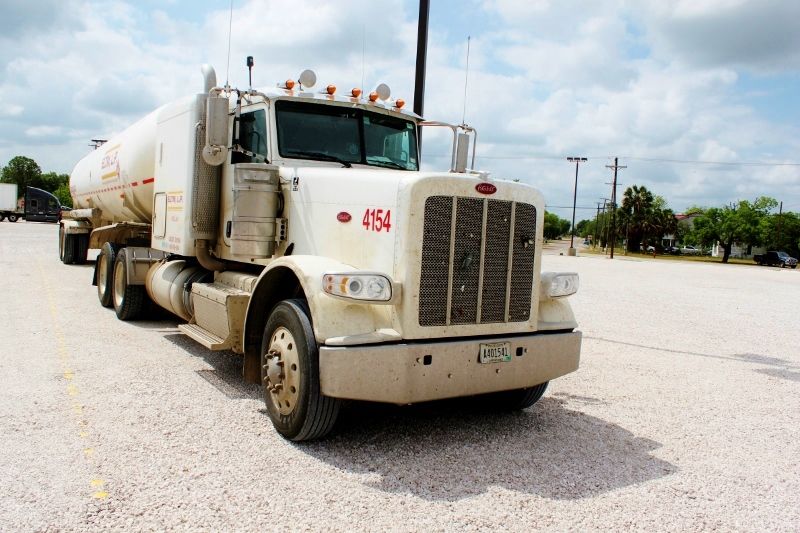
Clearly, neither asphalt or concrete are ideal materials for a truck parking design layout in 2020. What alternatives are there if you want to build a lot that can withstand (and handle) everything that a full-sized truck parking lot needs to handle? Gravel would be one option, but on its own, it tends to get scattered and rutted, very dusty in dry climates, and a buddy mess in rain. Gravel alone is simply unfit for a truck stop parking lot.
Combined with permeable pavers, however, gravel is a fine option. For a parking lot expecting such heavy-duty usage as a truck stop parking lot, permeable pavers combined with limestone, gravel, or other angular aggregates can far outperform asphalt or concrete.
TRUEGRID permeable pavers are made from the highest-quality recycled plastic, making them more durable than concrete which chips easily, or asphalt which melts and requires regular maintenance. It’s also a much faster install than the other roll-out pavers out there, and the pavers will withstand the weight of heavy vehicles even without gravel in them.
In terms of liquid drainage and retention, these permeable pavers require zero added drainage, as they function as drainage themselves. Any liquid, including rainwater, oil, gas, coolant, diesel, and more, will all drain directly through into the soil where it can be safely filtered and dispersed before it reaches any waterways or aquifers.
Plastic Permeable Pavers Can Help You Design the Perfect Truckstop

When it comes to building a truck stop parking lot, concrete and asphalt are no longer the best, most cost-effective materials now that we have materials much more suited for the job. When companies are saving themselves nearly a million dollars by installing permeable paving parking lots with gravel-fill, it would be ludicrous to waste money now, and in the future, by building an outdated asphalt or concrete lot.
The maintenance costs, installation costs, and negative environmental impact of these materials should be your key to avoiding them. If you want to build a truck stop layout that’s durable, resistant to weather damage, erosion, or traffic damage, you should heavily consider permeable pavers.
Not only are the permeable pavers from TRUEGRID made with the most eco-friendly practices, but they also outperform concrete and asphalt in terms of durability, and the overall cost of installing and maintaining a permeable paver truck lot is astronomically lower than that of other types of lots.

